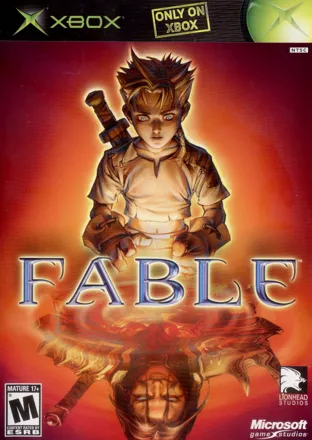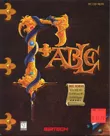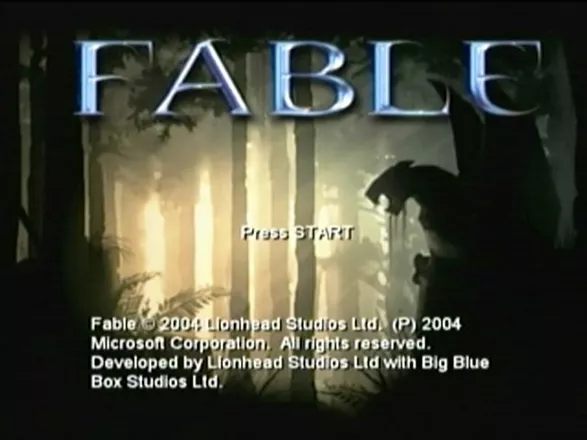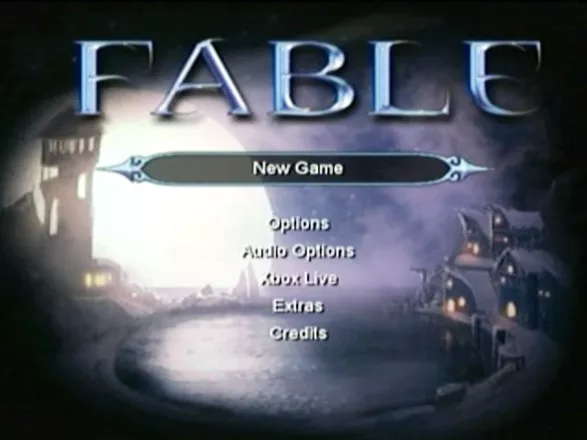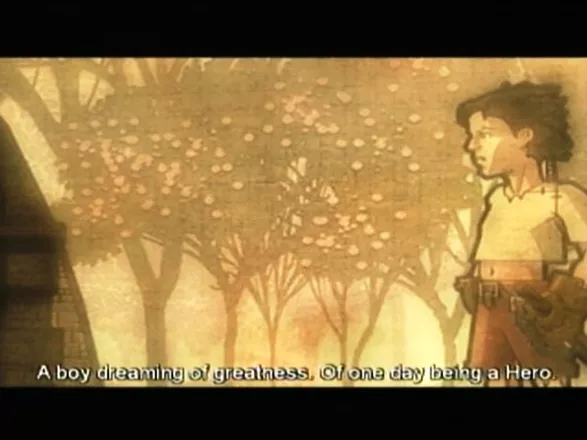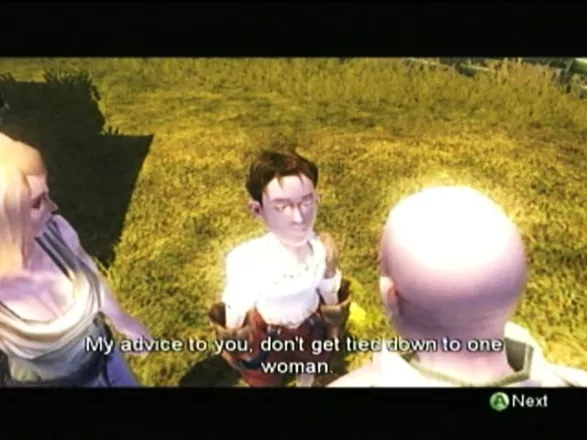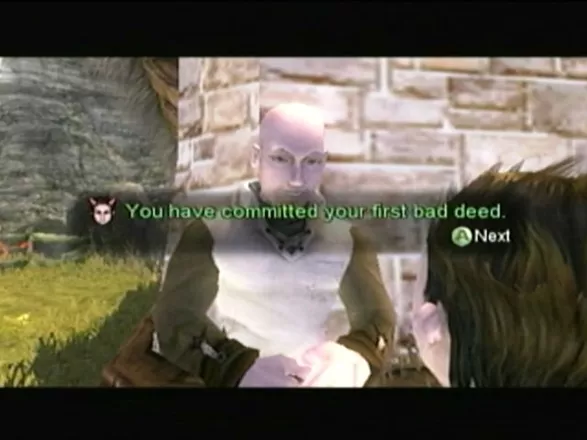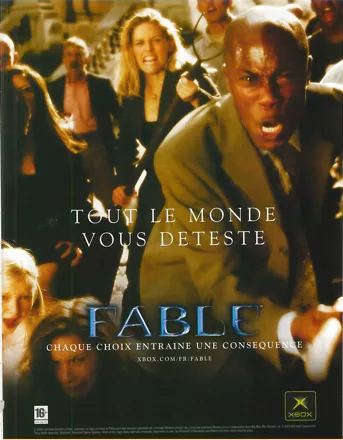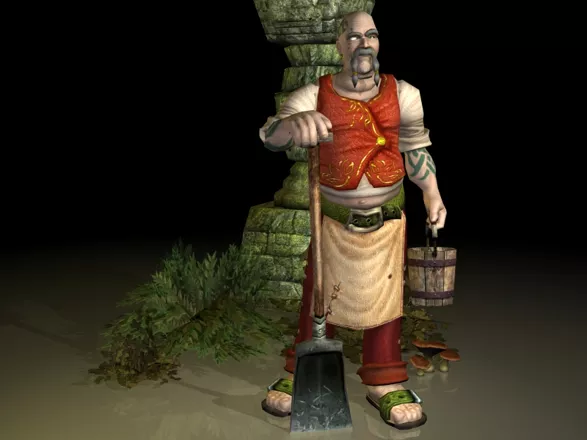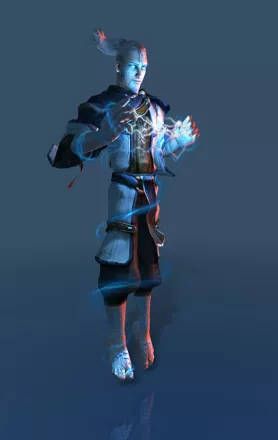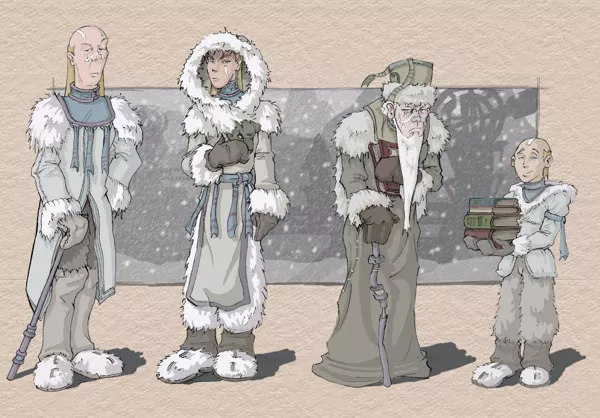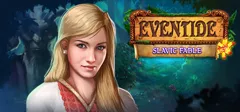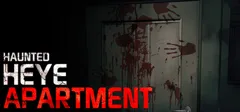Fable
Description official descriptions
At the town of Oakvale, in the land of Albion, a boy is sent on an errand by his father to get his sister a birthday present. When the deed is done, destiny unravels: the once peaceful town is suddenly under attack by bandit raids. The frightened child soon discovers his world crumbling in a matter of moments. Lying beside the body of his dead father, the boy is attacked by the gang, but is fortunately saved by a hero called Maze. He is then taken to the Heroes Guild where he is raised. Time has passed and the child has grown, and is ready to take up his own quest to rid the land of monsters and discover who was responsible for the deaths of his family.
Fable is a third-person action role-playing game that casts the player as "the child" or "the hero" who must perform various deeds to graduate from the Heroes Guild and define himself. The story progresses when the hero chooses "main quest items" from the Guild. Alternatively, there are also other quests that the player may complete in order to obtain gold and fame. Some quests allow the hero to "boast" in front of his fans. Boasting before a quests adds added difficulty, such as "completing the quest naked," however will allow additional gold and fame to be obtained.
The game introduces a "good and evil" morality system, similar to that of Knights of the Old Republic. Various situations - for example coming across a child being bullied - will force the player to make decisions which ultimately shape the main character. Making decisions deemed "good" earns the player good points, while being selfish and "bad" earns evil points instead. These decisions not only alter character stats, but also the hero's appearance and even the environment around them. "Evil" characters tend to look the part; growing horns, receiving scars and having a swarm of flies buzzing around him. A "good" character, on the other hand, might receive a halo and have butterflies swarming. However, other actions such as receiving wounds in combat or casting large amounts of magic also affect the player's appearance.
Actions also end up impacting the player's reputation, including actions that might be relatively unimportant in other games. For instance, if a player kicks a lot of chickens, various people might start referring to them by the title of "Chicken Chaser"; using "good" alignment magic might cause people to start calling the hero "Runemaster" instead.
There are three main modes of combat in Fable: melee, ranged and magic. The hero can equip any number of weapons, from swords to axes, and a variety of spells to either harm or help. What the hero wears also determines how people interact with them. Bright, saintly armor tends to make townspeople more willing to talk, while carrying a large axe and blood-red, darkened armor might cause them to be more apprehensive.
An experience upgrade system allows the player to specialize in one area, or spread throughout, to give the hero a more all-around set of abilities. There are three areas in which experience is gained: Physical, Skill and Will. Physical experience is earned primarily by using melee weapons and can be used to upgrade the hero's strength or health. Skill experience is primarily gained through archery or trading and boosts archery prowess, speed or guile. Will experience is gained through magic usage and is spent on new spells or upgrading old ones.
Spellings
- 神鬼寓言 - Simplified Chinese spelling
Groups +
- Console Generation Exclusives: Xbox
- Fable series
- Gameplay feature: Aging
- Gameplay feature: Arena fighting
- Gameplay feature: Armor / weapon sets
- Gameplay feature: Brothels
- Gameplay feature: Fishing
- Gameplay feature: Gambling
- Gameplay feature: House ownership
- Gameplay feature: Karma meter
- Gameplay feature: Multiple endings
- Japanese Xbox 360 games with full English support
Screenshots
Promos
Videos
See any errors or missing info for this game?
You can submit a correction, contribute trivia, add to a game group, add a related site or alternate title.
Credits (Xbox version)
164 People (138 developers, 26 thanks) · View all
| Designers | |
| Lead Coder | |
| Coders | |
| Lead Scriptor | |
| Scripters | |
| [ full credits ] | |
Reviews
Critics
Average score: 82% (based on 43 ratings)
Players
Average score: 3.9 out of 5 (based on 54 ratings with 2 reviews)
Chicken-kicking and its consequences
The Good
Fable, an unreasonably hyped-up project by the ambitious Peter Molyneux, was supposed to be a fully open RPG with wealth of options far outweighing the competition. The actual game turned out to be a much more modest experience, delivering a harsh blow to the fans' rose-tinted glasses.
Fable is superficially original in several ways. The game's world is essentially conceived as a playground for testing the actions of our on-screen incarnation. Human beings populating its world are treated as objects for our curious experiments rather than real characters. Since you don't talk in the game, they don't react to your words, but to your appearance and to your gestures. Certain haircuts work wonders when you want to charm ladies. An intimidating, horned, red-eyed warlock walking around with an unsheathed bloody sword won't become the soul of the party in the local tavern.
Your appearance is influenced by two main factors: your behavior towards other people and your own free customization. You can go to a barber and make yourself a haircut. You can visit a tattoo specialist. Everything you attach to yourself has special ratings determining simple folk's reactions. Your deeds - in case people have heard of them - will affect minds as well. If you are known for your charity work, villagers will greet you and clasp their hands the moment they see you. If you are the brutally murdering kind of celebrity, people will run away the moment they see you. At a certain point in the plot you'll have to decide whether to kill or to spare the life of a comrade with whom you grew up together. I decided not to kill this person. Shortly afterwards, I visited a town and heard some people saying to each other: "Do you see him, this is a great hero, he spared the life of another hero he could have killed".
You can go into a tavern and drink yourself into oblivion. If you drink too much, you'll puke. You can break windows in somebody's house and get arrested for vandalizing property. You can fish in rivers or grab a shovel and dig any spot in the game. You can walk around farting and belching. This is silly fun, but it's fun. Receive a world-saving quest from the respectable Guild Master and burp in his face after he says nobody can stop evil but you. Talk to a country girl, give her chocolates, make her fall in love with you, and then express your feelings by loudly farting. You can eventually get married, buy a house and live in it with your wife. You can visit her and buy things for her, or you can ignore her and even beat her up. Then she will divorce you, and you'll get evil points. By the way, you can also be gay in the game if you so wish.
Fable doesn't always forget more mainstream forms of entertainment, either. There is a solid amount of items to find, and the world (despite its stiflingly narrow structure) is theoretically open to you almost from the very beginning. Finding shortcuts and trying to get ahead of the linear plot can be done as well. NPCs talk to each other, and, like in Ultima games, follow their own schedules, getting up, going to other places, sleeping at nights. The hero ages with time, and this process is displayed graphically.
The game's visual style walks the middle ground between realism and cartoon, and it works really well, perfectly fitting the title itself - something that stands between a fairy tale and a serious ethical maxim. Some of the locations ooze charming beauty. Characters tend to have weirdly proportioned bodies and expressively grimacing faces. Exploration of this slightly bizarre world is complemented by a broad symphonic score, and the "British" voice acting is uniformly solid.
The Bad
The problem with Fable is its grating superficiality. It is full of interesting gimmicks that would enrich any good RPG and make it even better. But they are precisely what they are - gimmicks. Tricks to try out, extra stuff added to the basic mechanics. Unfortunately, it's precisely those mechanics that remain all too basic.
Here is one example to illustrate this. Getting married is an undeniably cool idea, though Fable is certainly not the first RPG to have it. In Quest for Glory V you could marry three different girls if you played your cards right. The point is, those girls had personalities, and you had to do different things to conquer their hearts. In Fable, the girls don't even have names, and the path to matrimony is frighteningly simple. All you have to do is be famous enough (which you become automatically anyway) and wear light armor! Then girls will come to you with a big heart floating over them. All you need to do then is to buy them a few gifts, and they'll propose marriage to you themselves.
This can be applied to most other aspects of Fable. Its morality system doesn't go very far at all, restricting itself mostly to cosmetic stuff - unlike, say, the system of Ultima IV, where your deeds were rated in deep ethical categories, or Fallout, where your choices could affect entire cities. But even the existing system is prone to weird glitches. There is no crime in Fable so awful that you won't be able to get the "holy" rank in spite of it. If you wear dark armor, people will be afraid of you no matter how many times you saved them from bandits.
Analyzing the more essential mechanisms of RPG design in Fable yields even more remarkable results. The game world is populated by nameless drones with no hint of anything resembling a personality. Sure, they react differently to your actions, but they don't differ from each other! They blurt out the same lines, they look the same, they act the same. Also, there is no player-controlled dialogue whatsoever. The hero of the game doesn't talk at all. He is never asked anything. He cannot ask anyone about anything. He is lost in the sea of guinea pigs that look like humans, a kind of pagan demi-god acquiring wives with candy boxes and cruelly mowing down guards who disliked his new beard.
The game's console origins are unfortunately all too obvious. The game world is way too small; while it can be explored at your own pace, the actual areas are dreadfully cramped and linear. You run along the road, and everything you can explore is in the immediate vicinity of that road. Frequent loading destroys any illusion of seamless traveling. Lack of jumping, climbing, crawling, swimming, and other physical activities negatively impact immersion already marred by the questionable world structure. The size of this world is comparable to the length of the game: there aren't enough sub-quests and other activities to make up for the disappointingly short playing time.
Character-building is simplified as well, guaranteeing that you'll deplete the meager list of skills for each character type very soon and will have no choice but to turn to another type. In other words, you build a powerful melee fighter so fast that you have nothing else to do but start turning him into an archer and a magic user as well. Combat itself is arcadish and offers little depth or genuine satisfaction.
The Bottom Line
Fable is a far cry from the hypothetical biggest, baddest, most free-form game its creators boasted of. It is a snack for the impatient modern crowd, degrading venerable RPG concepts to easily marketable gimmicks. Scaring potential brides and distracting demons with obscene gestures can be fun akin to eating junk food - and just like junk food, it cannot really satisfy you.
Xbox · by Unicorn Lynx (181579) · 2016
This game is the best of all games
The Good
Everything was perfect. The combat system was easily understandable, you could do just about anything you can ever Think of doing and the change of the character when you become good or evil.
The glitches in this game are really cool such as: the dig glitch (dig through walls by turning your back to the wall, equip the spade to your d-pad, dig, turn yourself around (if needed) and repeat until you are through the wall or gate) this was really cool because in the beginning of the game, if you go to Oakvale and dig through the bandit gate, you could dig yourself all the way through the bandit camp and get Skorm's bow.
Another glitch is the "jump" glitch. In the game there is no jump action but if you go to the bandit camp, go to the area where you find the silver key, and do the dig glitch (except up against the wall), you can dig yourself up the wall and than you can walk along the top and than "jump" onto the tent roofs and such.
There are other glitches but i wouldn't want to spoil all the fun for you.
The Bad
It was short BUT the definition of a FABLE is a SHORT story about a legendary person. Also, the load times were a bit long and the story would get a tiny bit annoying at times. Further more, you age like .6 of a year every time you level any attribute up once, but there is a way around this with the anti-aging glitch. Level everything up in the beginning of the game, and than get around 1,000,000 gold and than begin the find the archaeologist quest (the first one) and hero save, than go to the Temple of Avo and keep donating gold until your age goes down, reload the hero save and go back to the Temple of Avo and donate gold until your age goes down. keep doing this until your age goes back to 18 THIS TAKES A VERY LONG TIME (it took me about 10-14 hours to get enough gold and to max all stats and than go through this entire glitch).
also the secrets and the content left out was a real let down (if you have action replay or a modded xbox, this wont be a problem) but there was supposed to be a dragon in the game but they took it out. With action replay or a modded xbox, you can get access to the areas.
The Bottom Line
It is one of the best RPG's of this time and everyone should have it.
Xbox · by Todd Bello (28) · 2006
Discussion
| Subject | By | Date |
|---|---|---|
| a fable about a Fable | IceLa77e | Apr 14, 2023 |
Trivia
1001 Video Games
The Xbox version of Fable appears in the book 1001 Video Games You Must Play Before You Die by General Editor Tony Mott.
Credits
The credits are roughly 18 minutes long.
Hype
When Fable was released, Peter Molyneux had to apologize for it not meeting up to the expectations. He himself had created a hype around this game, calling it "the greatest RPG of all time". It even received some negative awards because of this.
A major complaint was that they failed to include the feature where the main character could have children, which was said to play an important role in the gameplay.
Macintosh version
The Macintosh version was originally announced by Feral Interactive to be released in early 2006, however it ended up being released two years later due to licensing issues.
Multiplayer
Originally, there was a multiplayer mode planned. Four players (one hero and three sidekicks) would be able to work together. This component was cancelled in March 2004 due to time constraints.
References
In the Lychfield Graveyard there is a grave stone that reads "Cpt. J. Sparrow: May the wind always be at your back". This is an obvious reference to the character Jack Sparrow from the film Pirates of the Caribbean: The Curse of the Black Pearl.
Awards
- GamePro (Germany)
- February 2005 - Best Console RPG in 2004 (Readers' Vote)
- Gamespot
- 2004 - Biggest Disappointment of the Year
- GameSpy
- 2004 – #10 Xbox Game of the Year
- 2004 - The Colonel Sanders Award for Best Use of Chickens (Xbox)
- Golden Joystick Awards
- 2004 - Xbox Game of the Year
Information also contributed by Andrew Shepard, Grov, MegaMegaMan, and Sciere.
Analytics
Related Sites +
-
Fable official website
Lionhead's official website for the Action-RPG Fable. -
Official Fable Discussion Board
The place to discuss Fable and it's possible sequels with the developers, Big Blue Box.
Identifiers +
Contribute
Are you familiar with this game? Help document and preserve this entry in video game history! If your contribution is approved, you will earn points and be credited as a contributor.
Contributors to this Entry
Game added by JPaterson.
Xbox 360 added by Parf.
Additional contributors: Terok Nor, Unicorn Lynx, Kabushi, Jamie Durrant, Cantillon, Patrick Bregger, piltdown_man, Plok, FatherJack.
Game added September 18, 2004. Last modified December 26, 2024.


